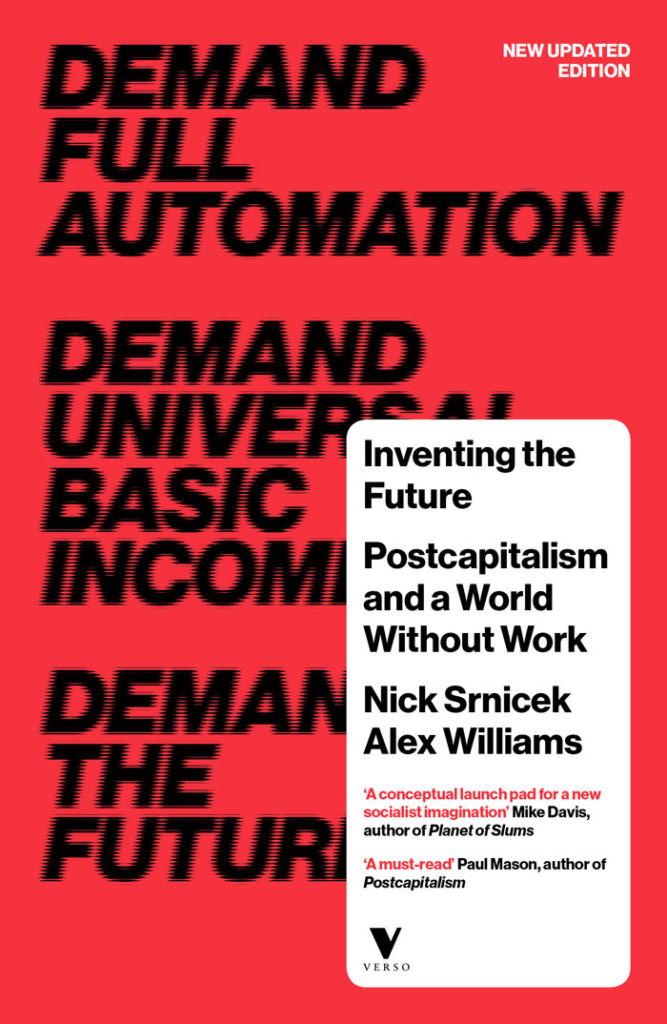In recent months I’ve remained quiet about the speculative turn, mostly because I’m reticent to rekindle the “Internet war” that broke out a couple of years ago mostly on blogs but also in various published papers. And while I’ve taught accelerationism in my recent graduate seminars, I opted for radio silence when accelerationism first appeared on the scene through the Accelerationist Manifesto, followed later by the book Inventing the Future. Truth is I have mixed feelings about accelerationism. Part of me wants to send “comradely greetings” to a team of well-meaning fellow Marxists and leave it at that. Lord knows the left needs to stick together. Likewise there’s little I can add that people like Steven Shaviro and McKenzie Wark haven’t already written, and articulated much better than I could. But at the same time a number of difficulties remain that are increasingly hard to overlook. To begin I might simply echo Wark’s original assessment of the Accelerationist Manifesto: two cheers for accelerationism, but only two!
What’s good about accelerationism? And what’s bad? I love the ambition and scope. Certainly the accelerationists’ willingness to challenge leftist orthodoxies is refreshing. I also like how the accelerationists demand that we take technology and science seriously. And I also agree that there are important tactical uses of accelerationist or otherwise hypertrophic interventions (Eugene Thacker and I have referred to them as exploits). Still I see accelerationism essentially as a tactic mistaken for a strategy. At the same time this kind of accelerationism is precisely what dot-com entrepreneurs want to see from the left. Further, and ultimately most important, accelerationism is paternalistic and thus suffers from the problems of elitism and ultimately reactionary politics.
Let me explain. I’ll talk first about Srnicek and Williams’ 2015 book Inventing the Future, and then address one of the central themes fueling the accelerationist juggernaut, Prometheanism. Well written, easy to read, and exhaustively footnoted, Inventing the Future is ostensibly a follow up to the Accelerationist Manifesto, although the themes of the two texts are different and they almost never mention accelerationism in the book. (Srnicek in particular is nothing if not shrewd and agile: present at the christening of #A, we also find him on the masthead of the speculative realist reader, and today nosing in on “platform studies.” Wherever he alights next will doubtless portend future significance.) The book is vaguely similar to Michael Hardt and Antonio Negri’s Declaration from 2012 in that it tries to assess the current condition of the left while also providing a set of specific steps to be taken for the future. And while the accelerationists have garnered significantly more attention of late, mostly because it feels so fresh and new, Hardt and Negri’s is the better book (and interestingly Srnicek and Williams never cite them).

Inventing the Future has essentially two themes. The first consists in a series of denunciations of what they call “folk politics” defined in terms of Occupy, the Zapatistas, Tiqqun, localism, and direct democracy, ostensibly in favor of a new “hegemony” of planetary social democracy (also known as Leninism). The second theme concerns an anti-work polemic focused on the universal basic income (UBI) and shortening the work week. Indeed even as these two authors collaborate and mix their thoughts, there seem to be two books mixed together into one. This produces an interesting irony: while the first half of the book unabashedly denigrates anarchism in favor of Leninism, the second half of the book focuses on that very theme (anti-work) that has defined anarchist theory since the split in the First International, if not since time immemorial.
What’s so wrong with “folk politics”? There are a few ways to answer this question. First the accelerationists are clearly frustrated by the failures of the left, and rightly so, a left debilitated by “apathy, melancholy and defeat” (5). There’s a demographic explanation as well. This is the cri de coeur of a younger generation seeking to move beyond what are seen as the sclerotic failures of postmodern theory with all of its “culturalist” baggage (which too often is a codeword for punks, queers, women, and people of color — more on that in a moment).
Folk politics includes “the fetishization of local spaces, immediate actions, transient gestures, and particularisms of all kinds” (3); it privileges the “small-scale, the authentic, the traditional and the natural” (10). The following virtues help fill out the definition:
immediacy…tactics…inherently fleeting…the past…the voluntarist and spontaneous…the small…withdrawal or exit…the everyday…feeling…the particular…the ethical…the suffering of the particular and the authenticity of the local (10-11)
Wow, that’s a lot of good stuff to get rid of. Still, they don’t quit there, targeting horizontalism of various kinds. Radical democracy is in the crosshairs too. Anti-representational politics is out as well. All the “from below” movements, from the undercommons to the black bloc, anything that smacks of “anarchism, council communism, libertarian communism and autonomism” (26) — it’s all under indictment. This unceasing polemic culminates in the book’s most potent sentence, if not also its most ridiculous, where the authors dismiss all of the following movements in one fell swoop:
Occupy, Spain’s 15M, student occupations, left communist insurrectionists like Tiqqun and the Invisible Committee, most forms of horizontalism, the Zapatistas…localism…slow-food (11-12)
That scoops up a lot of people. And the reader is left to quibble over whatever principal of decision might group all these disparate factions together. But the larger point is clear: for Srnicek and Williams folk politics emerged because of an outdated Left (i.e. the abject failures of social democracy and communism) (16-), and an outmaneuvered Left (i.e. the rampant successes of neoliberalism) (19-). Thus their goal is to update the left with a new ideology, and overhaul its infrastructure allowing it to modernize and scale up to the level of the planet.
In the second half of the book, particularly in chapters 5 and 6, Srnicek and Williams elaborate their vision for anti-work and post-work. This hinges on the concept of full automation, and they provocatively assert that “the tendencies towards automation and the replacement of human labor should be enthusiastically accelerated” (109). Yet the details are scant. What kind of tech are we talking about? We get some vague references at the outset to “Open-source designs, copyleft creativity, and 3D printing” (1), then again later to “data collection (radio-frequency identification, big data)” and so on (110). But one thing this book does not provide is an examination of the technology of modern capitalism. (Srnicek’s Platform Capitalism is an improvement thematically but not substantively: he provides an analysis of political economy, but no tech audit.) Thus Inventing the Future has a sort of Wizard of Oz problem at its core. It’s not clear what clever devices are behind the curtain, we’re just supposed to assume that they will be sufficiently communistical if we all believe hard enough.
At the same time the authors come across as rather tone deaf on the question of labor, bemoaning above all “the misery of not being exploited,” as if exploitation is some grand prize awarded to the subaltern. Further, they fail to address adequately the two key challenges of automation, both of which have been widely discussed in political and economic theory: first that automation eliminates jobs for people who very much want and need them, leading to surplus populations, unemployment, migration, and intrenched poverty; and second that automation transforms the organic composition of labor through deskilling and proletarianization, the offshoring of menial labor, and the introduction of technical and specialist labor required to design, build, operate, and repair those seemingly “automagical” machines. In other words, under automation some people work less, but everyone works differently. Automation reduces work for some, but changes (and in fact often increases) work for others. Marx’s analysis of machines in Capital is useful here, where he addresses all of these various tendencies, from the elimination of labor and the increase in labor, to the transformation of the organic composition of labor — the last point being the most significant. (And while machines might help lubricate and increase the productive forces — not a bad thing — it’s clear that machines are absolutely not revolutionary actors for Marx. Optimistic interpretations gleaned from the Grundrisse notwithstanding, Marx defines machines essentially as large batteries for value. I have yet to find any evidence that today’s machines are any different.)
So the devil is in the details: what kind of technology are we talking about? But perhaps more importantly, if you get rid of the “folk,” aren’t you also getting rid of the people? Srnicek and Williams try to address this in chapter 8, although I’m more convinced by Hardt and Negri’s “multitude,” Harney and Moten’s “undercommons,” or even formulations like “the part of no part” or the “inoperative community” found scattered across a variety of other texts. By the end Srnicek and Williams out themselves as reticular pessimists: let’s not specify “the proper form of organization” (162), let’s just let it happen naturally in an “ecology of organizations” (163). The irony being that we’re back to square one, and these anti-folk evangelists are hippy ecologists after all. (The reference to function over form [169] appears as a weak afterthought to help rationalize their decision, but it re-introduces the problem of techno-fetishism, this time a fetishism of the function.)
To summarize, accelerationism presents a rich spectrum of problems. The first stems from the notion that technology/automation will save us, replete with vague references to “the latest technological developments” unencumbered by any real details. Second is the question of capitalism itself. Despite the authors’ Marxist tendencies, it’s not at all clear that accelerationism is anti-capitalist. In fact accelerationism would be better described as a form of post-capitalism, what Zizek likes to mock as “capitalism with a friendly face.” What is post-capitalism exactly? More capitalism? A modified form of capitalism? For this reason it becomes difficult to untangle accelerationism from the most visionary dreams of the business elite. Isn’t this exactly what dot-com entrepreneurs are calling for? Isn’t the avant-garde of acceleration taking place right now in Silicon Valley? This leads to a third point: accelerationism is a tactic mistaken for a strategy. Certainly accelerationist or otherwise hypertrophic methods are useful in a provisional, local, which is to say tactical way. But accelerationism is, in my view, naïve about how capitalism works at a strategic level. Capitalism wants nothing more than to accelerate. Adding to the acceleration will help capitalism not hinder it. Capitalism is this accelerating force, from primitive accumulation on up to today. (Accelerationists don’t dispute this; they just simply disagree on the moral status of capitalism.) Fourth and finally is the most important problem revealed by accelerationism, the problem of elitism and reactionary politics. Given unequal technological development, those who accelerate will necessarily do so on the backs of others who are forced to proletarianize. Thus accelerationists are faced with a kind of “internal colonialism” problem, meaning there must be a distinction made between those who accelerate and those who facilitate acceleration through their very bodies. We already know who suffers most under unequal technological acceleration, and it’s not young white male academics living in England. Thus their skepticism toward the “folk” is all too often a paternalistic skepticism toward the wants and needs of the generic population. Hence the need for accelerationists to talk glowingly about things like “engineering consent.” It’s hard to see where this actually leads. Or more to the point who leads: if not Leninists then who, technocrats? Philosopher kings?
*
Accelerationism gains much inspiration from the philosophy of Prometheanism. If accelerationism provides a theory of political economy, Prometheanism supplies a theory of the subject. Yet it’s not always clear what people mean by this term. In a recent lecture titled “Prometheanism and Rationalism” Peter Wolfendale defines Prometheanism in such general terms that it becomes a synonym for any number of things: history and historical change; being against fatalism and messianism; being against the aristocracy; being against Fukuyama; being for feminism; the UBI and post-capitalism; the Enlightenment and secularism; deductive logic; overcoming (perceived) natural limits; technology; “automation” (which as I’ve just indicated is the most problematic concept of them all). Even very modest and narrow definitions of Prometheanism — technology for humans to overcome natural limit — present their own problems and wind up largely deflating the sloganeering of it all. “Okay so both the hydrogen bomb and the contraceptive pill are equally Promethean? So then who adjudicates their potential uses?” And we’re left with Prometheanism as the latest YAM philosophy (Yet Another Morality).
Still, Prometheanism has a particular vision for itself and it’s worth describing the high points. I can think of six specific qualities. (1) Prometheanism defines itself as posthuman or otherwise antihuman. (2) Prometheanism is an attempt to transcend the bounds of physical limitation. (3) Prometheanism promotes freedom, as in for instance the freedom to change the body through hormone therapy. (4) Prometheanism sees itself as politically progressive. (5) Prometheanism sees itself as being technologically savvy. (6) Prometheanism proposes to offer technical solutions to real problems.
But is any of this true? Interestingly Bernard Stiegler provided an answer to some of these questions already in 1994, and it’s worth returning to his book from that year Technics and Time, 1: The Fault of Epimetheus to fill out a conversation that has, thus far, been mostly one-sided. Stiegler’s book is long and complicated, and touches on many different things including technology and the increased rationalization of life, by way of some of Stiegler’s key influences including Gilbert Simondon, André Leroi-Gourhan, and Bertrand Gille. Let me focus however on the second part of the book, where Stiegler examines the two brothers Epimetheus and Prometheus.
A myth about powers and qualities, the fable of Epimetheus and Prometheus is recounted by the sophist Protagoras starting at line 320c in Plato’s dialogue of that name. In Stiegler’s retelling of the story, we begin with Epimetheus, who, via a “principle of compensation” governed by notions of difference and equilibrium, hands out powers and qualities to all the animals of the Earth. For instance extra speed might be endowed to the gazelle, but only by way of balanced compensation given to another animal, say a boost in strength bestowed upon the lion. Seemingly diligent in his duties, Epimetheus nevertheless tires before the job is complete, shirking his duties before arriving at humankind, who is left relatively naked without a special power or quality of its own. To compensate humankind, Prometheus absconds with “the gift of skill in the arts and fire” — “τὴν ἔντεχνον σοφίαν σὺν πυρί” — captured from Athena and Hephaestus, respectively, conferring these two gifts to humanity (Plato, “Protagoras,” 321d).
In this way humans are defined first not via technical supplement but through an elemental fault — this is Stiegler’s lingering poststructuralism — the fault of Epimetheus. Epimetheus forgets about us, leaving us until the end, and hence “Humans only occur through their being forgotten; they only appear in disappearing” (188). But it’s more than that: a fault followed by a theft, and hence a twin fault. Humanity is the “fruit of a double fault–an act of forgetting [by Epimetheus], then of theft [by Prometheus]” (188). Humans are thus a forgotten afterthought, remedied afterward by a lucky forethought.
“Afterthought” and “forethought” — Stiegler means these terms quite literally. Who is Epimetheus? And who is Prometheus? Greek names often have etymological if not allegorical significance, as is the case here. Both names share the root “-metheus,” cognate with manthánō [μανθάνω], which means learning, study, or cultivation of knowledge. Hence a mathitís [μαθητής] is a learner or a student. (And in fact in a very literal sense “mathematics” simply refers to the things that one learns, not to arithmetic or geometry per se.) The two brothers are thus both varieties of learners, both varieties of thinkers. The key is which variety. The key is the Epi– and the Pro-.
“Epi carries the character of the accidentally and artificial factuality of something happening, arriving, a primordial ‘passibility,’” Stiegler explains. “Epimetheia means heritage. Heritage is always epimathesis. Epimetheia would also mean then tradition-originating in a fault that is always already there and that is nothing but technicity” (206-207). Hence Epimetheus means something like “learning on the basis of,” “thinking after,” or, more simply, or “afterthought” or “hindsight.” This is why Epimetheus forgets, why he is at fault, why he acts foolishly, because these are all the things that generate hindsight.
Prometheus on the other hand is “foresight” or “fore-thought.” If Epimetheus means “thinking and learning on the basis of,” Prometheus means something more like “thinking and learning in anticipation of.” In this way, Prometheus comes to stand in for cleverness (but also theft), ingenuity, and thus technics as a whole.
But is that all? Is the lesson simply to restore Epimetheus to his position next to Prometheus? To remember the Epimethean omission along with the Promethean endowment? In fact the old Greek myth isn’t quite finished, and, after initially overlooking the ending, Stiegler eventually broaches the closing section on Hermes. For even after benefiting from its Promethean supplement, humanity remains incomplete. Specifically, the gods notice that Man has a tendency toward war and political strife. Thus Hermes is tasked to implant a kind of socio-political virtue, supplementing humanity with “the qualities of respect for others [αἰδώ] and a sense of justice [δίκη]” (Plato 322c). In other words, a second supplement is necessary, only this time a supplement not rooted in the identitarian logic of heterogeneous qualities. “Another tekhnē is required,” writes Stiegler, “a tekhnē that is no longer paradoxically…the privilege of specialists” (201). This point about specialists is key — all you Leninists take note — because on Zeus’s command Hermes delivers respect and justice generically and equally across all persons, not via the “principle of compensation” based on difference and equilibrium used previously by Epimetheus to divvy up the powers and qualities of the animals. Thus while some people may have a talent for the piano, and others might be gifted in some other way, justice and respect are bestowed equally to all.
This is why politics is always a question of the “hermeneutic community,” that is, the ad hoc translation and interpretation of real political dynamics; it comes from Hermes (201). At the same time politics also means “the community of those who have no community” because there is no adjudication of heterogenous qualities, no truth or law stipulated in advance, except for the very “conditions” of the political (those “hermeneutic conditions,” namely αἰδώ and δίκη, respect and justice).
To summarize, the Promethean story has three moments, not one, and all three ought to be given full voice:
- Default of origin (being forgotten about by Epimetheus/Hindsight)
- Gaining technicity (fire and skills from Prometheus/Foresight)
- Revealing the generic (“respect for others and a sense of justice” from Hermes)
This strikes me as a much better way to think about Prometheanism overall, better than the narrow definition of “using technology to overcome natural limits.” Recognizing all three moments, Prometheanism (if we can still call it that) entails not just technological advancement, but also insufficiency and failure, along with a political consciousness rooted in generic humanity.
And now would be a good time to pass the baton over to the Xenofeminists, who make much better use of accelerationism than its original authors do. The Xenofeminist manifesto provides a more holistic picture of what might simply be called a “universalism from below” — yes, that very folk politics that Srnicek and Williams seek to suppress — doing justice not only to Prometheus, but to Epimetheus and Hermes as well:
Xenofeminism understands that the viability of emancipatory abolitionist projects — the abolition of class, gender, and race — hinges on a profound reworking of the universal. The universal must be grasped as generic, which is to say, intersectional. Intersectionality is not the morcellation of collectives into a static fuzz of cross-referenced identities, but a political orientation that slices through every particular, refusing the crass pigeonholing of bodies. This is not a universal that can be imposed from above, but built from the bottom up — or, better, laterally, opening new lines of transit across an uneven landscape. This non-absolute, generic universality must guard against the facile tendency of conflation with bloated, unmarked particulars — namely Eurocentric universalism — whereby the male is mistaken for the sexless, the white for raceless, the cis for the real, and so on. Absent such a universal, the abolition of class will remain a bourgeois fantasy, the abolition of race will remain a tacit white-supremacism, and the abolition of gender will remain a thinly veiled misogyny, even — especially — when prosecuted by avowed feminists themselves. (The absurd and reckless spectacle of so many self-proclaimed ‘gender abolitionists’ campaign against trans women is proof enough of this). (0x0F)
Alexander R. Galloway is a writer and computer programmer working on issues in philosophy, technology, and theories of mediation. Professor of Media, Culture, and Communication at New York University, he is author of several books and dozens of articles on digital media and critical theory, including Protocol: How Control Exists after Decentralization (MIT, 2006), Gaming: Essays in Algorithmic Culture (University of Minnesota, 2006); The Interface Effect (Polity, 2012), and most recently Laruelle: Against the Digital (University of Minnesota, 2014), reviewed here in 2014. Galloway has recently been writing brief notes on media and digital culture and theory at his blog, on which this post first appeared.


